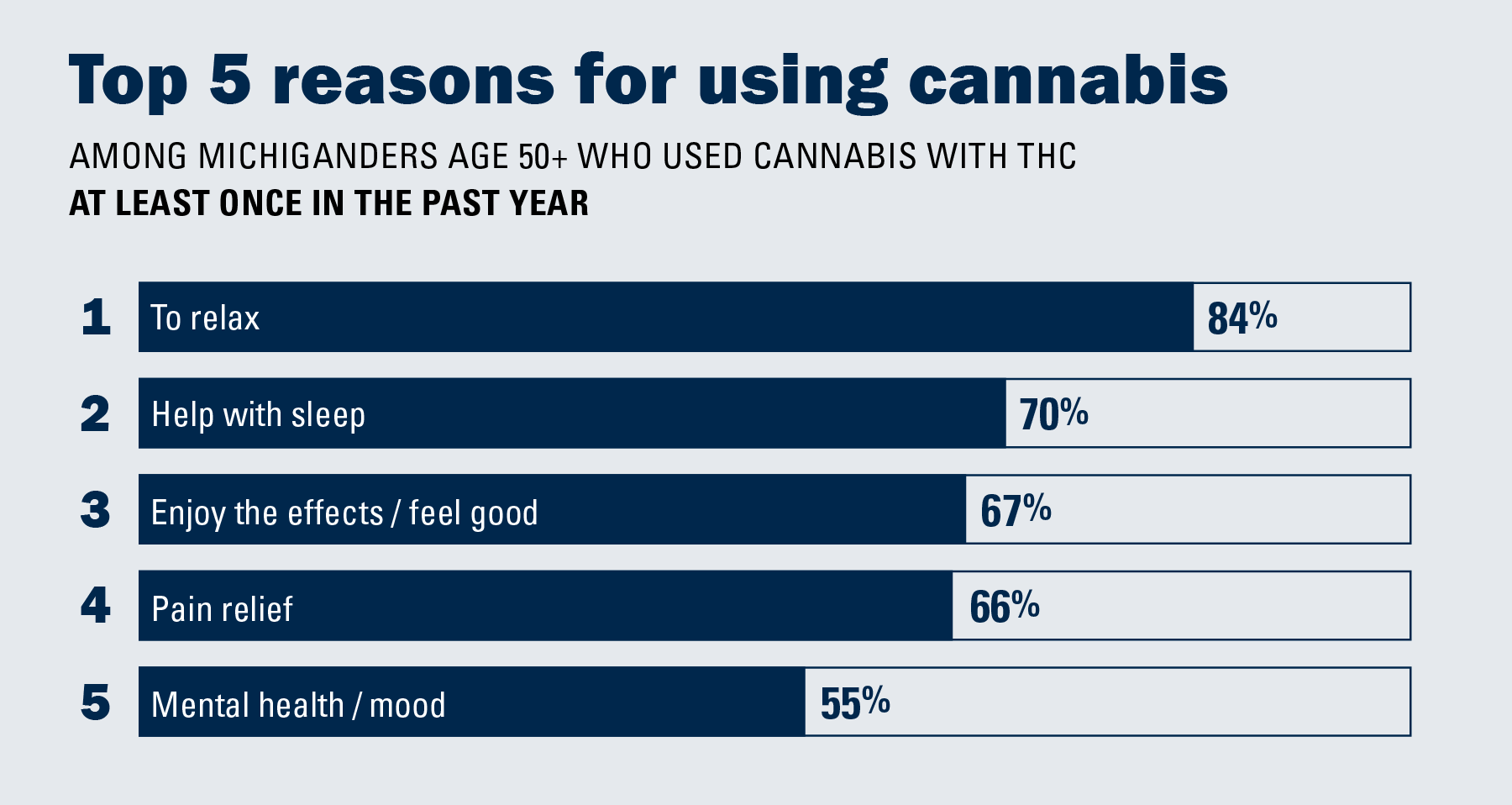
Michigan Key Findings
Among Michigan adults age 50 and over, 17% used cannabis at least once a month in the past year.
21% of Michiganders 50 and over who used cannabis in the past year said they drove within 2 hours of use at least one time.
Among older adults who used cannabis at least once a month, 64% have discussed cannabis use with their health care providers.
Sixteen years ago this November, Michigan voters approved medical cannabis use by adults in their state. Ten years later, they approved recreational use.
Now, a new poll shows that 27% of Michiganders over age 50 used cannabis products that contain the psychoactive compound THC at least once in the past year. That’s a higher percentage than the 21% of people in this age group in the rest of the United States who say they used cannabis in the past year.
And 14% of older Michiganders said they use cannabis at least weekly, with 9% using it daily or almost daily. Both figures are higher than the percentages for people in the same age group in the rest of the country, at 9% weekly and 5% daily.
The new findings come from the Michigan Poll on Healthy Aging, based at the University of Michigan’s Institute for Healthcare Policy and Innovation and funded by the Michigan Health Endowment Fund and Michigan Medicine, U-M’s academic medical center.
The poll asked people aged 50 and older about their use of cannabis products that contain the psychoactive compound THC, not CBD-only products.
In addition to the Michigan findings, which can be explored further at https://michmed.org/4e2KW, the U-M team has also published a report on national data through the National Poll on Healthy Aging, which is supported by AARP and Michigan Medicine.
Both the Michigan and national poll results show that many older adults who use cannabis say they drive within two hours of doing so — a practice that’s potentially risky to themselves and others.
In all, 21% of Michiganders who use cannabis products said they have driven within two hours of using cannabis at least once in the past year. The percentage was higher — 26% — among older Michiganders who use cannabis at least monthly. Both figures were similar to national data.
In addition, 64% of older Michiganders who use cannabis at least monthly said they have discussed their use with a health care provider. Such discussions can help identify situations where cannabis might interact with prescription drugs and over-the-counter medicines, and substances like alcohol.
The new data also show that older Michiganders who use cannabis at least monthly were more likely than their peers nationwide to report at least one potential sign of dependence or addiction.
Specifically, older Michiganders who use cannabis at least monthly were more likely than older adults in the rest of the country to say:
- They needed to use more cannabis than before to feel the desired effects (35% vs. 22%)
- They had increased the frequency or amount of their cannabis use (20% vs. 11%)
- That using the same amount of cannabis had less effect on them than before (22% vs. 14%)
All of these signs could indicate dependence or addiction. On another such sign, older Michiganders who use cannabis at least monthly were about the same as their peers: 12% said they experience strong desires or cravings to use cannabis, compared with 13% in the rest of the U.S.
In addition to providing insights into older Michiganders’ patterns of and reasons for use of cannabis, the poll also gauges the knowledge and attitudes of all older Michiganders, including those who don’t use cannabis.
In all, 83% of all Michiganders age 50 and older agreed with the statement that cannabis is stronger today than it was 20 or 30 years ago, compared with 79% of older adults in other states. And 72% of older Michiganders agree with the statement that cannabis can be addictive, the same percentage as in the national sample.
Erin E. Bonar, Ph.D., the U-M addiction psychologist and researcher who worked with the poll team on the new analysis, notes that both statements have been shown to be true: that today’s cannabis is more potent, and that individuals can become addicted to it.
“Our findings, in Michigan and nationally, show the need for more education and awareness, especially among those who choose to use cannabis more frequently,” she said. “Nearly every Michigander sees advertising for cannabis-related businesses on billboards, signs and other platforms in Michigan, but the risks from impaired driving, interaction with medications and addiction don’t get that same level of attention.”
Bonar notes that awareness of how much more potent cannabis is today than decades ago is important for older adults who may have used or been aware of the drug in their youth, and are now interested in trying it given legalization and commercial availability of new forms including those that people eat, drink or apply to the skin.
The poll’s findings also suggest that cannabis use as part of social events is more accepted in Michigan than in other parts of the country.
When it comes to their reasons for using cannabis, older Michiganders who do so were much more likely than people their age in the rest of the U.S. to say they use cannabis to make a social gathering more fun or to connect with others. In all, 43% of Michiganders who use cannabis at least once a year cited this as one of their reasons, compared with 30% of those in other states.

Health-related reasons were even more common. In all, 45% of Michiganders who use cannabis at least once a year, and 66% of those who use it monthly, said they do so to try to treat a medical condition. The percentages of each group saying they used it to try to treat pain were 66% and 75%, respectively, and the percentages saying they used it to try to help their mental health or improve their mood were 55% and 66%, respectively. In addition, 70% of all those who had used cannabis in the past year, and 84% of those who had used it monthly, said they had done so to try to help them sleep.
Bonar said this shows that older adults in Michigan are looking for ways to cope with these conditions and may need greater medical attention.
Poll director Jeffrey Kullgren, M.D., M.P.H., M.S., a primary care physician at the VA Ann Arbor Healthcare System and associate professor of internal medicine at U-M, said it’s important for Michiganders who use cannabis for any purpose to speak to their regular health care provider about their use.
“Not only could health care providers help identify potential interactions between cannabis and any prescription drugs that older adults might be taking, they may also be able to offer alternate and more effective options for easing insomnia, pain, mental health symptoms or other issues,” he said.
The poll was a nationally representative survey conducted by NORC at the University of Chicago for IHPI and administered online and via phone in February and March 2024 among 1,079 Michigan older adults and 3,012 non-Michigan adults ages 50 and over. The sample was subsequently weighted to reflect the U.S. and Michigan populations.